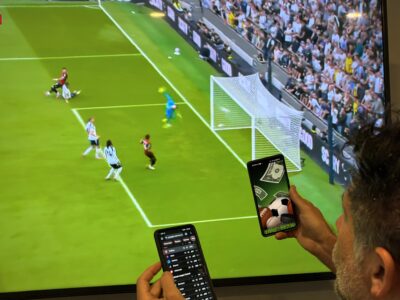Sports betting is everywhere now—on your phone, during every game, and wrapped into everyday conversations. It’s pitched as fun and harmless. But for many, it turns into something much more serious: addiction. Any one is susceptible to it, teenagers, women, and older adults: it can happen to any of us.
One powerful example? Harry Levant.
Harry wasn’t your typical image of a gambler. He was a successful trial lawyer, husband, and father. But behind the scenes, he was losing tens of thousands of dollars a day, hiding it from everyone, and chasing his losses until it all crashed down. He eventually stole money from clients to feed his addiction, lost his law license, and faced criminal charges.
But that’s not where Harry’s story ends.
Today, he’s in long-term recovery. He’s now a licensed therapist and advocate for gambling reform, helping others find the support he once needed working for the Public Health Advocacy Institute (PHAI) at Northeastern University as the Director of Gambling Policy. In this role, he leads efforts to treat gambling addiction and advocate for comprehensive public health regulation of the gambling industry.
Sports betting commercials are a near-constant presence during broadcasts and at the ball park. A recent analysis of NBA and NHL broadcasts in over just five days found gambling-related messages at a rate of about 2.8 per minute. Americans were expected to bet an estimated $30 billion on the 2025 NFL season. Sports betting has reached an all time record breaking high in this year.
For Super Bowl LVII, a record 50.4 million adults were expected to place a wager.
Estimated legal betting for the 2025 March Madness tournament was over $3.1 billion.
Why Sports Betting Is Especially Risky
- It feels like skill, not luck—so people bet more.
- It’s available 24/7, especially on mobile apps.
- It escalates quickly, and chasing losses becomes compulsive.
- It’s emotionally triggering, offering escape from stress, boredom, or anxiety.
When It’s More Than Just a Habit
Some red flags that betting has become a problem:
- Hiding gambling from others
- Chasing losses with bigger bets
- Anxiety, guilt, or sleeplessness
- Pulling away from relationships or responsibilities
What Recovery Looks Like
Real recovery isn’t just about stopping—it’s about rebuilding. That might mean:
- Reaching out for therapy or support groups like Gamblers Anonymous
- Creating accountability with someone you trust
- Replacing betting with meaningful activities
- Focusing on healing, not winning back money
Final Thought
Harry Levant’s story is proof that even the most serious gambling addiction can be turned around. The first step? Reaching out.
If you or someone you care about is struggling, you’re not alone. Please feel free to reach out if you have any questions, would like direction or a consultation.




